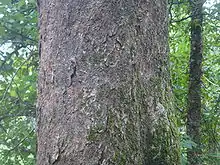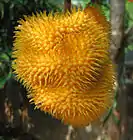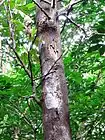| Artocarpus hirsutus | |
|---|---|
 | |
| Bark | |
| Scientific classification | |
| Kingdom: | Plantae |
| Clade: | Tracheophytes |
| Clade: | Angiosperms |
| Clade: | Eudicots |
| Clade: | Rosids |
| Order: | Rosales |
| Family: | Moraceae |
| Genus: | Artocarpus |
| Species: | A. hirsutus |
| Binomial name | |
| Artocarpus hirsutus | |
Artocarpus hirsutus, commonly known as wild jack,[1] is a tropical evergreen tree species that is native to India, primarily in Kerala, but also in Karnataka, Maharashtra and Tamil Nadu, where it grows in moist, deciduous to partially evergreen woodlands.[3][4]
Description
Artocarpus hirsutus grows as a canopy tree and can reach a height of up to 35 metres (115 ft) and about 4.5 m (15 ft) in girth.[5]
The leaves of this tree are simple and phyllotaxy is alternate. The shape can be described as elliptic or ovate with 10–25 cm (4–10 in) × 5–14 cm (2–6 in) size. When it is young it is densely hirsute beneath. The apex of leaf is sub-acute or shortly acuminate, base is rounded or sub-acute, and margins undulate. Ten to twelve pairs of secondary nerves can be visible, and the length of petiole is about 1.5–3 cm (0.6–1.2 in).[6]
Its flowers are unisexual, in axillary inflorescences and its fruits are syncarps and very sweet, changing to an orange hue when ripe. Its simple, alternate leaves will ooze latex if broken. It is harvested for its wood.[3][4]
The ripe fruit of A. hirsutus is eaten after removing the spiny outer skin. The structure of the fruit is similar to that of the much larger jackfruit. The seeds are also edible, usually fried as a snack.
Distribution and habitat
Artocarpus hirsutus grows at elevations from sea level to around 1,000 m (3,300 ft) in places with an annual rainfall of 1,500 mm (60 in) or more. The species is endemic to the Western Ghats where it is found in evergreen forests.[5] It is a common tree in evergreen and semi-evergreen forests from South Maharashtra to Kanyakumari[6]
Uses
Artocarpus hirsutus is prized for its durable timber which is comparable in quality with teak. The timber was used extensively in the construction of ceilings, door frames and furniture in older buildings, especially in Kerala.[7] The famous snake boats of Kerala are often hewn out of the Anjili's wood.[8] 140 tons of A. hisutus wood from Kerala was used for Tim Severin's ship Sohar, in which he traveled from Muscat to Canton in 1980-81.
Diseases
The important diseases of Artocarpus hirsutus reported from Southern part of India (Kerala state) are Pink disease (Corticium salmonicolor)[9] & Macrophomina leaf spot (Macrophomina phaseolina).[10]
In culture
This tree, locally called anjili in Kerala is used to make Palliyodam, a type of large built and used by Aranmula Parthasarathy Temple in Kerala for the annual water processions of Uthrattathi Jalamela and Valla Sadhya.[11]
Gallery
 Unripe fruit
Unripe fruit Ripe fruit
Ripe fruit Trunk with fungal infection
Trunk with fungal infection
References
- 1 2 Barstow, M.; Deepu, S. (2018). "Artocarpus hirsutus". IUCN Red List of Threatened Species. 2018: e.T61220325A61220328. doi:10.2305/IUCN.UK.2018-1.RLTS.T61220325A61220328.en. Retrieved 20 November 2021.
- ↑ Encycl. 3(1): 211. 1789 [19 Oct 1789] "Plant Name Details for Artocarpus hirsutus". IPNI. Retrieved January 27, 2010.
- 1 2 "Artocarpus hirsutus". Germplasm Resources Information Network. Agricultural Research Service, United States Department of Agriculture. Retrieved January 27, 2010.
- 1 2 H.S. Suresh, Harish R. Bhat (December 17, 1998). "Flora". Flora of IIS: Centre for Ecological Sciences. Bangalore, India: Indian Institute of Science. Retrieved January 27, 2009.
- 1 2 "Artocarpus hirsutus - MORACEAE".
- 1 2 Page, Navendu (2017). Endemic Woody Plants of the Western Ghats. Bangalore: Trail Blazer Printers and Publishers. ISBN 978-93-5279-072-2.
- ↑ "Song of the waves - Parayil A. Tharakan Blog: Anjili, a tree of many uses". 15 November 2010.
- ↑ "Aqua craft". Archived from the original on 2012-07-25. Retrieved 2012-07-22.
- ↑ http://www.cabdirect.org/abstracts/20083207488.html.
{{cite book}}: Missing or empty|title=(help) - ↑ Prakash, V. R.; Venugopal, S.; Thomas, S. (2007). "First report of macrophomina leaf spot (Macrophomina phaseolina) on Artocarpus hirsutus in India". Plant Archives. 7 (2): 929–930.
- ↑ "Explained: What is a Palliyodam, and why a Kerala actor was arrested for photoshoot on it". thenewsminute. Retrieved 13 September 2021.
